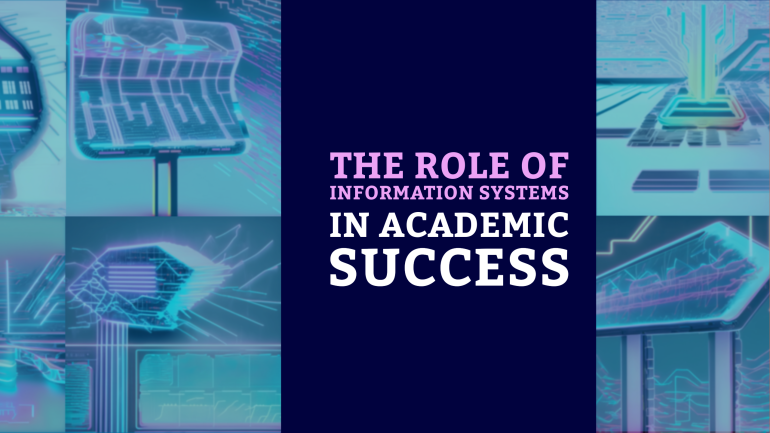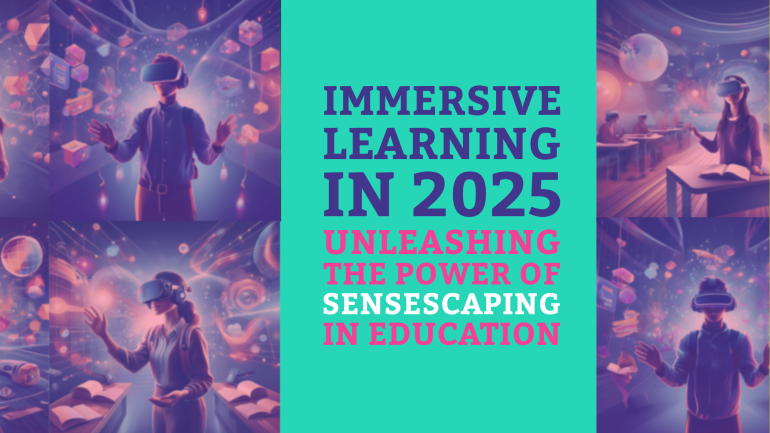Table of Contents
TL;DR: Empowering Education: The Role of Information Systems in Academic Success
- Information systems play a crucial role in enhancing academic success by providing access to resources and tools needed for learning.
- Effective use of information systems can help students in organizing, managing, and storing academic materials efficiently.
- Information systems facilitate communication between students and educators, enabling collaboration and feedback for better academic performance.
- Access to online databases, e-books, and research tools through information systems can enhance students’ learning experience.
- Information systems also aid academic institutions in monitoring student progress, providing timely interventions and support for academic success.
Information Systems play a crucial role in the academic success of students in today’s digital age. With the advancement of technology, Information Systems provide students with quick and easy access to a vast array of knowledge, resources, and tools that can greatly enhance their learning experience. From online libraries and academic databases to collaboration platforms and virtual classrooms, Information Systems have revolutionized the way students acquire and process information.
However, it is important for students to be aware of the potential pitfalls of relying too heavily on Information Systems for their academic success. While these systems can streamline research and study processes, they also pose risks such as the proliferation of misinformation and the temptation to plagiarize. Therefore, it is important for students to develop critical thinking skills and digital literacy to effectively navigate and utilize Information Systems in their academic pursuits.
Fundamentals of Information Systems
Definition and Components
Components of an information system are important to understanding how these systems function. An information system is a set of interconnected components that collect, process, store, and distribute information to support decision-making and control in an organization. The main components of an information system include hardware, software, data, procedures, and people.
Evolution of Information Systems in Academic Environments
Any academic environment relies heavily on information systems to support various functions such as administration, teaching, learning, and research. Over the years, information systems in academic environments have evolved from basic administrative tools to sophisticated platforms that integrate learning management systems, online collaboration tools, virtual classrooms, and big data analytics.
Systems such as Learning Management Systems (LMS) have revolutionized the way academic institutions deliver course materials, engage with students, and assess learning outcomes. These systems have made it easier for educators to reach students remotely, personalize learning experiences, and track student progress effectively. By leveraging data analytics, institutions can also gain valuable insights into student performance trends, identify at-risk students, and improve overall academic success rates.
Information Systems in Academic Learning
Clearly, information systems play a critical role in academic learning by providing students with the necessary tools and resources to succeed in their studies. These systems encompass a wide range of technologies and platforms that facilitate the acquisition, organization, and dissemination of information in an educational setting.
E-learning Platforms and Learning Management Systems
One of the key components of information systems in academic learning is e-learning platforms and learning management systems. These systems provide students and educators with a centralized platform for accessing course materials, submitting assignments, engaging in online discussions, and monitoring academic progress. By leveraging these systems, students can access learning resources anytime, anywhere, fostering a more flexible and personalized learning experience.
Online Libraries and Resource Databases
To enhance the academic research and learning experience, online libraries and resource databases play a crucial role. These platforms provide students with access to a vast array of scholarly articles, research papers, e-books, and other educational materials. By utilizing these online libraries, students can explore a wealth of information on various subjects, aiding them in conducting thorough research and writing high-quality papers.
The availability of online libraries and resource databases also helps students stay up-to-date with the latest developments in their field of study, enabling them to incorporate current knowledge and trends into their academic work.
Enhancing Collaboration and Communication
Information Systems for Student Collaboration
Despite the challenges of physical distance and time constraints, information systems play a vital role in facilitating collaboration among students in academic settings. By leveraging online platforms and tools, students can work together on group projects, share resources, and communicate effectively regardless of their locations. Virtual learning environments enable seamless collaboration by providing a centralized space for discussions, file sharing, and real-time interactions. Such systems not only enhance productivity but also foster a sense of community among students in online programs.
Communication Tools for Faculty and Administration
Student communication tools are crucial for faculty and administration to stay connected with students and keep them informed about important updates, deadlines, and announcements. Platforms such as email, instant messaging, and learning management systems enable efficient communication channels between educators and students. These tools not only streamline information dissemination but also allow for timely feedback and support to enhance student learning outcomes.
Furthermore, information systems provide faculty and administration with valuable insights into student engagement and performance, enabling them to identify at-risk students early on and provide targeted interventions to support their academic success.
Data Management and Analytics
Student Information Systems and Academic Performance Tracking
On any given day, educational institutions collect a vast amount of data on students’ academic performance. This information includes grades, attendance records, test scores, and even demographic details. Through student information systems, schools can efficiently track and manage these data points to gain insights into student progress and potential areas of improvement. By effectively analyzing this data, educators can identify at-risk students early on and provide timely interventions to support their academic success.
Role of Big Data in Educational Decision-Making
For educational institutions, the role of big data in decision-making cannot be understated. By harnessing the power of advanced analytics and data mining, schools can uncover patterns and trends that were previously hidden. Big data analytics can provide valuable insights into student performance, learning preferences, and even predict future academic outcomes. This information allows educators to tailor teaching methods, develop personalized learning plans, and make data-driven decisions to enhance overall academic success.
Management of big data in education comes with challenges such as ensuring data privacy and security. It is imperative for institutions to establish robust data governance policies to protect sensitive student information. Additionally, data accuracy and reliability are crucial for making informed decisions. By implementing data quality assurance measures and regular audits, educational institutions can ensure that the insights derived from big data analytics are reliable and actionable for improving academic outcomes.
Personalization of Learning
For students, the journey to academic success is often filled with various challenges and obstacles. One approach that is increasingly being adopted to help students overcome these challenges is the personalization of learning. By tailoring educational experiences to suit individual learning styles, preferences, and abilities, educational institutions can better support students in achieving their academic goals.
Adaptive Learning Technologies
Any discussion about personalization of learning would be incomplete without mentioning adaptive learning technologies. These innovative tools use algorithms to analyze students’ learning patterns and customize the learning experience accordingly. By providing real-time feedback and recommendations, adaptive learning technologies enable students to progress at their own pace, focusing on areas where they need the most help.
Customizable Learning Pathways
Learning pathways refer to the sequence of courses or learning activities that students undertake to achieve their educational objectives. Customizable learning pathways allow students to have a more tailored educational experience by choosing the courses, projects, or assignments that align with their interests and career goals. This approach empowers students to take ownership of their learning journey and engage more deeply with the material.
Plus, customizable learning pathways can also help educators identify areas where students may be struggling and provide additional support or resources to ensure their success. By offering a more flexible and personalized approach to education, customizable learning pathways have the potential to transform the way students learn and ultimately improve academic outcomes.
Challenges and Solutions
Once again, the role of information systems in academic success faces various challenges that need to be addressed for optimal outcomes. From privacy concerns to issues of accessibility, educators and policymakers must navigate these obstacles diligently to ensure a conducive learning environment for all.
Privacy and Security Concerns in Educational Information Systems
One of the primary challenges in educational information systems is the privacy and security concerns surrounding student data. With the increasing use of digital platforms and online tools in education, the risk of data breaches and unauthorized access to sensitive information has become a significant worry. Protecting student privacy and ensuring the security of educational information systems is paramount to maintain trust and compliance with data protection regulations.
Addressing the Digital Divide and Ensuring Access for All
An crucial aspect of leveraging information systems for academic success is to address the digital divide and ensure equal access for all students. Disparities in access to technology and the internet can severely impact a student’s ability to engage in online learning and utilize educational resources effectively. Efforts should be made to bridge this gap by providing resources, such as devices and internet connectivity, to underserved communities and individuals.
Additionally, educational institutions can collaborate with policymakers and organizations to implement initiatives that promote digital literacy and offer training programs to enhance students’ skills in utilizing information systems effectively. By addressing the digital divide, we can create a more inclusive and equitable learning environment that fosters academic success for all students.
The Future Direction of Information Systems in Education
Emerging Technologies and Their Potential Impact
Impact: As technology continues to advance at a rapid pace, the future of information systems in education looks promising with the integration of emerging technologies such as artificial intelligence, virtual reality, and machine learning. These technologies have the potential to revolutionize the way students learn and educators teach by providing personalized learning experiences, virtual simulations, and data-driven insights into student performance. Artificial intelligence can analyze vast amounts of student data to provide tailored learning recommendations, while virtual reality can create immersive learning environments that enhance student engagement and understanding. Machine learning algorithms can predict student performance and provide early intervention strategies to improve learning outcomes.
Integrating Information Systems with Pedagogical Innovations
Future: Integrating information systems with pedagogical innovations is crucial in shaping the future of education. By combining technology with cutting-edge teaching methods, educators can create dynamic and interactive learning experiences that cater to the individual needs of students. For instance, incorporating gamification elements into classroom activities can make learning more enjoyable and effective, while using data analytics tools can help educators track student progress and adjust their teaching strategies accordingly. This integration can lead to more efficient teaching practices, higher student engagement, and better academic outcomes.
Summing up
Now that we have explored the role of information systems in academic success, it is clear that these technological tools play a crucial role in helping students achieve their educational goals. From providing access to vast amounts of information to facilitating collaboration and communication, information systems have revolutionized the way students learn and succeed in the academic environment. By leveraging these tools effectively, students can improve their efficiency, organization, and overall academic performance.
FAQ
Q: What is the role of information systems in academic success?
A: Information systems play a crucial role in academic success by providing students and educators with access to relevant, timely, and accurate information to support teaching, learning, and research.
Q: How do information systems help students in their academic pursuits?
A: Information systems help students by providing access to online resources, facilitating communication with professors and peers, organizing academic schedules, and assisting in research and data analysis.
Q: How can educators leverage information systems to enhance teaching methods?
A: Educators can leverage information systems to create interactive learning experiences, access educational materials, provide feedback to students, and track student progress to tailor teaching methods accordingly.
Q: What are some examples of information systems used in academia?
A: Examples of information systems used in academia include learning management systems (LMS), student information systems (SIS), library management systems, academic databases, and online collaboration tools.
Q: How can students and educators ensure the effective use of information systems for academic success?
A: Students and educators can ensure effective use of information systems by staying updated on technological advancements, undergoing training on system functionalities, utilizing system features to their full potential, and maintaining data security and privacy practices.




